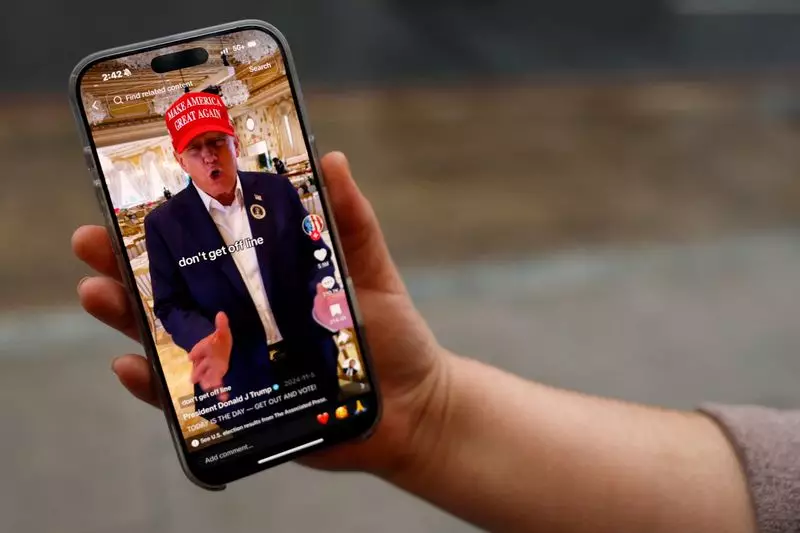In a striking twist of political maneuvering, TikTok recently announced that it was restoring access to its platform in the United States, coinciding with President-elect Donald Trump’s declaration of his intention to reinstate the app once he takes office. This decision is particularly significant given the backdrop of increasing tension between the U.S. and China, fueled by security concerns over data privacy and ownership. TikTok’s Chinese parent company, ByteDance, has faced intense scrutiny, leading to its temporary suspension on the grounds of national security just before the new legislation to ban the app came into effect. This abrupt turn of events exemplifies the intersection of politics and technology, characterized not just by market decisions, but by a complex web of relationships involving government authority, corporate interests, and user expectations.
Political Influence on Technology
Policies surrounding the use of social media apps like TikTok are profoundly affected by political considerations. President Trump had previously positioned himself against TikTok due to alleged links to the Chinese government and concerns over data mishandling. However, the new administration appears ready to take a more lenient approach. In his recent statements, Trump emphasized his wish for the U.S. to have a significant ownership stake in a potential partnership with TikTok, highlighting a shift from an outright ban to a cooperative strategy that aims to alleviate security concerns. This development resonates with a broader trend in American politics, where bipartisan agreement on handling China and its technology firms remains elusive, complicating the future landscape of digital services in the U.S.
The response from TikTok’s user base has been a mix of relief and uncertainty. Upon the announcement, users were quickly flooded with notifications indicating that service was being restored, which was met with optimism among its nearly 170 million American users. The app reportedly played a vital role in empowering over seven million small businesses, making it an essential channel for commerce and engagement in the digital space. However, the chaos surrounding its accessibility drove many users to seek alternatives, spiking interest in competing platforms like China-based RedNote. Furthermore, while TikTok users clamored for continuity, others in the marketing landscape were left scrambling to devise contingency plans as they faced the potential fallout of losing a primary advertising venue, a scenario some executives referred to as a “hair on fire” moment.
As TikTok resumes its services, underlying legal complexities remain a pressing concern. Republican senators have voiced skepticism regarding the feasibility of Trump’s proposed measures to extend the ban’s effective date, arguing that a legal framework already exists that prevents any extension without satisfying divestment conditions. This highlights a critical confrontation between the administration’s aspirations and established legal precedents. The bipartisan agreement on maintaining national security remains robust, suggesting that although TikTok’s revival may bring temporary reprieve, the deeper structural concerns over data privacy and sovereignty will need to be adequately addressed.
A Future Beyond the Ban?
Looking ahead, TikTok’s future in the U.S. hinges not only on presidential policies but also on ongoing negotiations regarding ownership and data governance. The implications of a deal wherein the U.S. administration would support TikTok pivoting to a joint venture reflect broader concerns about foreign corporate interests in essential digital infrastructure. Conversations about potential sales or partnerships, including unconfirmed negotiations involving high-profile figures like Elon Musk or investment firms such as BlackRock, suggest that corporate maneuvering will continue to shape TikTok’s trajectory as much as political decisions.
Cultural Impact: The User Perspective
Amid the extensive political and economic narrative, it’s crucial to acknowledge TikTok’s cultural significance. The platform has emerged as a pivotal space for youth engagement, creativity, and self-expression, particularly during times of global upheaval. These are elements that extend beyond mere commerce; they tap into broader trends influencing social behaviors and societal expectations. As the platform navigates these challenging waters, both users and creators will be watching closely to see how these developments impact their virtual identities and the role TikTok plays in shaping cultural discourse moving forward.
Final Thoughts
The resurgence of TikTok in the U.S. landscape serves as a poignant reminder of the intricate relationships between technology, politics, and society. As the administration grapples with the complexities of governing digital platforms within a global context, users, creators, and marketers alike will be keenly observing outcomes that balance innovation with national security. The eventual resolution of TikTok’s status in the U.S. will undoubtedly set precedents for how other foreign technology firms operate within American borders, shaping the landscape of digital media and interaction for years to come.

